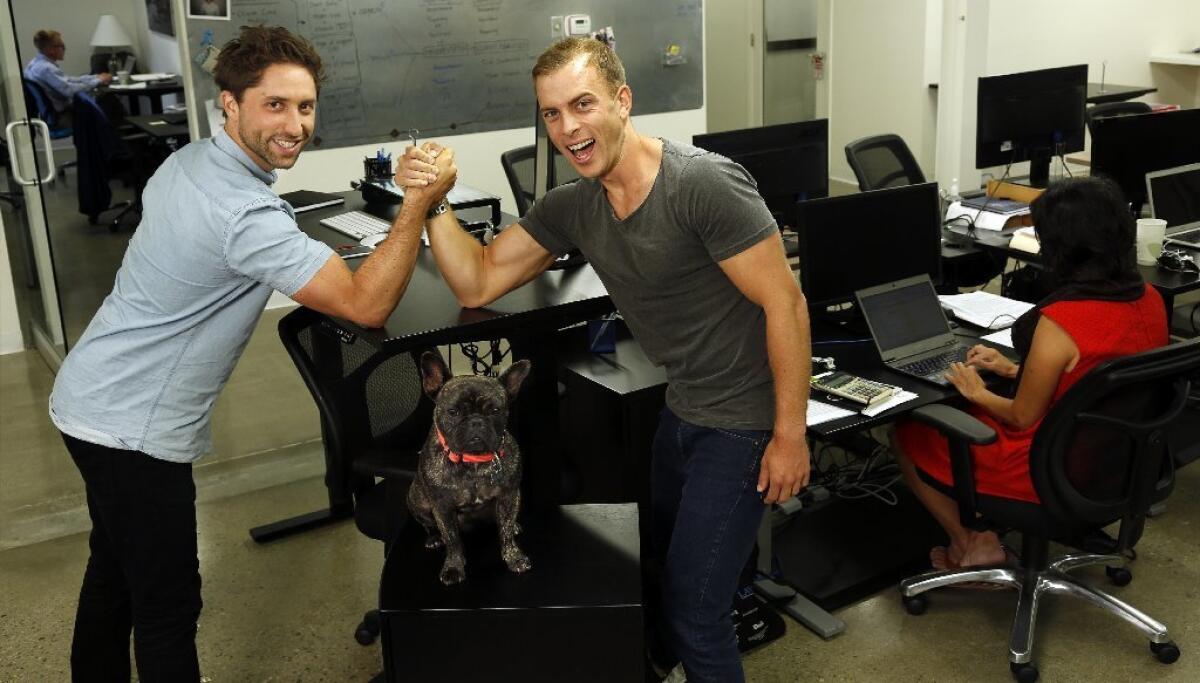TaskUs co-founder Bryce Maddock provides helping hands for tech start-ups

The gig: Bryce Maddock, 30, is co-founder and chief executive of TaskUs, a Santa Monica company that describes itself as “a progressive, new-age outsourcer” that handles customer service, call-center operations and other functions for start-ups as well as established firms. Revenue reached $80 million in 2016, up from $6 million in 2013, Maddock says.
On patrol: TaskUs often picks up jobs beyond what typical outsourcing companies handle. One example that Maddock uses is what TaskUs does for the West Hollywood dating app Tinder. “Part of the ‘police force’ that is keeping pornography, offensive images and harassment off Tinder is us,” Maddock says. “They use computer vision technology, but there is still a huge amount of work a human has to do. We have a large team of people who spend all day reviewing Tinder conversations and images, making sure they comply with Tinder’s standards.”
Traffic control: “We also do customer service and order placement for over half of the food delivery start-ups,” Maddock says. Work that TaskUs employees do includes “in-app texting the driver to make sure they are on time, calling the restaurant to find out why the food is late, calling the customer to let them know they are going to get a credit. We’re like the air traffic control of food delivery.”
Partnership: Maddock and TaskUs co-founder and President Jaspar Weir have been friends since their days as Santa Monica High School students. “He’s the one who gets everybody hyped and excited about an idea,” Maddock says, describing himself as more of a nuts-and-bolts leader who works out “how to run with the idea, how to move the ball down the field.”
Using the bad: Maddock says he took a rough turn as an adolescent, “doing stupid things. We drank. We’d smoke weed.” At 15, Maddock says he lost that juvenile sense of invulnerability after a gang beating, the death of a friend and a short-term health crisis for his mother. “I had an anxiety attack after that. I was done with drugs,” Maddock says. “For the first time, I got serious about school.” That change carried him through college, helping him graduate summa cum laude with a degree in international relations from New York University after only three years.
Parental strengths: Maddock’s dad was a screenwriter — credits included the cult sci-fi classic “Tremors” — who made up bedtime stories “on demand.” His mom was a physical therapist and his inspiration helping him quell his rebelliousness and cope with dyslexia. “My dad gave me this ability to imagine things that didn’t exist,” Maddock says, “and my mom pushed me until I brought what I imagined to fruition.”
Starting out: Maddock and Weir got the entrepreneurial bug at age 17. The two started a business called Club Access, renting out nightclubs that were licensed as restaurants for safe, liquor-free parties for teens. They charged a $15 entrance fee. “We had 800 to 1,000 kids show up every single Monday night,” Maddock says.
Failure one: But it wasn’t all smooth sailing for Maddock after NYU. He was earning good money and working long hours as an investment banker. Then Weir came up with a great daydream: Get away from the rat race. Open a yogurt shop. In Buenos Aires. Unfortunately, they actually did it. “After a month we realized” that it wasn’t going to work,” Maddock says. “I found myself at 22 back in my parents’ house, sleeping in the single bed that I grew up in, and without my investment banker salary.”
Failure two: Maddock and Weir brainstormed another idea, building on his interest in international relations and other cultures: virtual personal business assistants using workers from various countries. It ate up the last $10,000 they had. “It was a miserable failure,” Maddock says. “But in the process we opened a small office in the Philippines, trying to centralize, trying to get our hands around what looked like a good quality product.”
Start-up success: The two refined the idea, and using their friends’ start-up businesses as their initial clients, “We realized we could do transcribing audio and voice mail, content monitoring, customer service for a fraction of the cost by building up in the Philippines.” The workforce went from seven to 100 in the first several months. Now TaskUs has more than 7,000 employees, mostly in the Philippines, and expects $120 million in revenue in 2017.
Giving back: Maddock and Weir say they have adopted, in the Philippines, the same benefits standards used by much more established companies. “They get four weeks of vacation a year, four months for maternity leave,” Maddock says. “And we will fully fund the education of one child of any teammate who has been with us for a year or more, for as long as they are working for us.”
Personal: When he isn’t working, Maddock is often training for triathlons. And sometimes personal pleasures do enter the office, with employee dogs trotting around, including Maddock’s French bulldog, Mr. Carter. The main rule is the dogs much get along quietly with the other dogs. “Mine gets a pass on that,” Maddock jokes. “It’s one of the perks of being the CEO.”
For more business news, follow Ronald D. White on Twitter: @RonWLATimes
More to Read
Inside the business of entertainment
The Wide Shot brings you news, analysis and insights on everything from streaming wars to production — and what it all means for the future.
You may occasionally receive promotional content from the Los Angeles Times.








